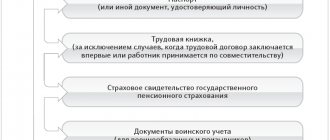Home / Labor Law / Dismissal and layoffs / Dismissal
Back
Published: 01/12/2018
Reading time: 8 min
0
647
To conclude any employment contract, the consent of both the employer and the employee is required. Obviously, to terminate this document, the initiative of at least one of the two interested parties is necessary.
However, the legislation also provides for a special option for ending work, which is determined by circumstances beyond the control of both interested parties. The procedure for documenting and the grounds for termination of the contract in this case are provided for in Article 83 of the Labor Code.
Managers of organizations and enterprises resort to such dismissal quite rarely, so in practice, HR department employees have many questions regarding the practical application of this article .
- List of circumstances
- Conditions of dismissal
- Procedure for terminating an employment contract
- Work and payments
Dear readers! To solve your problem, call hotline 8 or ask a question on the website. It's free.
Ask a Question
List of circumstances
In total, labor legislation provides for thirteen grounds or valid reasons for terminating an employment contract. The most basic of them are:
- a legal restriction has arisen that excludes the possibility of holding a particular position (for example, such a decision was made as a result of legal proceedings);
- the total number of employees with foreign citizenship is greater than the established share for certain types of economic activity (according to government regulations);
- cancellation of a previously adopted court decision on reinstatement of an employee by a court decision;
- lack or loss of access to state or industrial secrets;
- deprivation of an employee’s license or any other special right (for example, driving public transport) for a period of more than two months;
- complete disqualification, excluding the performance of work duties;
- an emergency situation recognized by a decision of the government or local government (accidents, epidemics, disasters);
- death of a representative of one of the parties signing the contract; complete loss of ability to work (according to the expert opinion of the medical commission);
- deprivation of liberty of an employee imposed by judicial authorities for criminal acts;
- not being elected to a specific position;
- reinstatement of a former employee to his previous place of work (according to a court decision or instructions from the labor inspectorate);
- military conscription or assignment to civilian service, which does not allow you to remain in the workplace.
Other objective circumstances may also arise that force the employee to leave his place of work. For example, moving to another locality or region, illness of a relative or child (care required).
But in such cases, the employer decides the issue at his own discretion.
He can either recognize the reason as valid or consider it insignificant for initiating dismissal. In this case, the employee will have to leave on a general basis, promptly sending a notice to the manager of his desire to receive the final payment. That is, the employee will not be able to avoid the so-called detention.
Grounds for dismissal for reasons beyond the control of the parties
The reasons for terminating the contract for reasons beyond the control of the parties may be the following situations, detailed in the Labor Code of the Russian Federation, Art. 83:
- A citizen working at an enterprise is drafted into the Russian Army;
- The former employee was reinstated at work by court order;
- The applicant is not elected to the position;
- The employee is convicted and deprived of liberty;
- Employee's disability;
- Death or recognition as missing of one of the parties;
- Force majeure;
- Disqualification of a specialist;
- Expiration, suspension, deprivation of an employee of a special right;
- Non-access to state secrets (mandatory requirement at work);
- The order to reinstate the former employee was cancelled.
Conditions of dismissal
In order to correctly apply in practice all the grounds listed in labor legislation, four conditions must be adhered to:
- any of the grounds must have documentary evidence provided by the employee or his representative at the place of work (for example, a certificate confirming death, or a writ of execution);
- it is necessary to strictly adhere to the procedure established at the legislative level, including sending notifications and offering vacancies (in case the employee needs to get an easier job for health reasons);
- it is required to comply with all general rules regarding such procedures (for example, issue an order in accordance with Article of the Labor Code under number 84.1, or issue a work book on the last day of work in accordance with Article 140 of the Labor Code);
- it is necessary to correctly formulate the reasons and provide precise references to legislative norms in all main documents (orders, personal files, work books).
The main article is indicated in all documents that require registration (for example, Article 83 of the Labor Code, part one, paragraph four - dismissal due to the imposition of a term of imprisonment).
There are cases in which termination of an employment contract may be considered illegal.
Dismissal due to death is usually not contested in court.
employee, his conviction and conscription into the armed forces. There are also rare cases of foreign citizens defending their rights, first hired and then fired with reference to Article 83 of the Labor Code.
The most frequently contested case is the termination of an employment contract caused by the reinstatement of a former employee. However, the manager cannot refuse reinstatement - the interested employee presents the corresponding writ of execution at work.
Therefore, the best way out of this situation would be to offer a vacant position to the dismissed employee or sign an agreement with him .
Basic provisions
The law provides for various grounds for terminating the relationship between an employer and an employee. Basically, this is the personal desire of the employee. Every person has the right to resign of his own choice. In some cases, the employer may be forced to do this. Article 83 of the Labor Code of the Russian Federation provides for the termination of an employment contract due to circumstances beyond the control of the parties. In other words, external reasons force a person to leave his job.
This applies to persons of military age. They may be sent to military or alternative service. The second paragraph of the article provides for reinstatement by decision of the court or labor inspectorate.
Some positions can be held for a certain period of time. The candidate is selected through a competition. It is carried out for the vacancy:
- in the civil service;
- in universities;
- to the Ministry of Defense.
Accordingly, if a person does not pass the competition again, the employment contract with him is terminated.
The conviction of the employee is considered a circumstance beyond his control. If he is serving a sentence in prison , then he is fired from his job. At the end of his term, he will not be able to occupy certain places. Thus, previously convicted persons cannot work in government agencies.
Procedure for terminating an employment contract
To avoid a legal appeal, the employer must adhere to the following procedure:
- an order is issued only if a document is submitted to the HR department confirming the grounds for termination of the contract (medical report, writ of execution, summons, etc.);
- the order must contain a reference to the document provided to the HR department (its name and registration number are indicated, the reason specified in this document is entered);
- the initiator may be a third party (for example, a court that sent a writ of execution or a military committee that sent a summons for conscription);
- if we are talking about reinstatement of a former employee, the relevant court decision or written order of the labor inspector is indicated as the basis (in addition, the dismissed person is offered a vacancy and he accepts it or writes a refusal);
- the interested employee must be familiarized with the issued order (he has the right to refuse to sign it, which is recorded in a special act, which is then added to the personal file);
- after the employee signs an already issued order (or does not sign it), employees of the personnel department make notes in the personal file and work book - the reason is indicated as the basis and a reference is given to the article of labor legislation (83rd article of the Labor Code);
- The accounting department accrues all funds required by law, which are issued to the employee or his relatives along with the work book.
Payment for a business trip on a day off - how to properly arrange and receive it. We do not recommend that you falsify sick leave - it is a criminal offense. Follow the link for more information.
How to get maternity benefits for your husband? Read more about this in our article!
Administrative punishment
Having committed certain offenses, a specialist loses the right to continue his professional activities and is subject to dismissal (Article 83, paragraph 8).
Attention
Only a court can determine an employee's guilt.
When making a decision to disqualify a specialist, supporting documents from the court must be provided to the employer (a copy of the court decision or an extract from it).
Additionally
As a rule, employees performing managerial functions are subject to disqualification.
Dismissal upon conscription
To end legal relations, clause 1, part 1, article 83 of the Labor Code of the Russian Federation, the employee submits a summons to the personnel department. It must comply with the form provided for by order of the Minister of Defense of the Russian Federation dated October 2, 2007 No. 400, signed by the military commissar.
The summons will be legal if one of the options is indicated in the “reasons for the summons” paragraph:
- to be sent to the place of service;
- for referral to alternative service.
Other reasons do not lead to termination of official legal relations.
For your information
The Labor Code does not specify specific terms for termination of the contract. Which day will be the last should be determined by agreement of the parties. But no later than the day specified in the agenda.
General procedure for dismissing an employee
If grounds arise, the employer should carry out the standard dismissal procedure:
- notification of the interested party;
- execution of a dismissal order indicating the reason;
- familiarization against the signature of the employee;
- working out the remaining term;
- registration in the work book and personal file;
- final settlement.
The listed stages may differ depending on the specifics of a particular dismissal.
For example, if an employee died or was declared missing, then there is no one to familiarize him with the order and take signatures from anyone. The employer skips these steps, but there is a need to obtain documents confirming the death of the employee. The correctness of the procedure directly depends on the professionalism of the HR and accounting department specialists.
As a result, termination of employment relations is possible for reasons beyond the control of the parties. Dismissal is not always carried out at the will of the employee or employer. Death, natural factors, loss of health or incapacity and other events may cause termination of an employment contract. It is important for the employer to properly formalize the dismissal, taking into account all the factors and circumstances of the particular case.
Dismissal due to other reasons under Article 83 of the Labor Code
One of the reasons for an employee leaving an organization on the basis of Art. 83 is the reinstatement of the former employee at work by a court decision (clause 2). This situation is unexpected for both the employer and the employee. But, if a former employee defended his right to this job in court, then the employer is obliged to restore it immediately (based on Article 396 of the Labor Code of the Russian Federation). A citizen subject to dismissal can only count on severance pay or another available vacancy.
After the former employee is reinstated to his workplace, the organization has every right to challenge the court’s decision in the appellate instance. And, if the claim is satisfied, the company can terminate the employment relationship with the negligent employee again on the basis of clause 11.
Important
If a candidate is not elected to a position or the period for his election through a competition has expired, then he can also be dismissed (clause 3).
The reason for terminating the contract without the will of the parties is the termination of the employee’s access to state secrets (clause 10). Security clearance can be terminated for various reasons: violation of obligations (for example, disclosure of classified data), routine activities of the institution, presence of medical contraindications, and other situations.
Extraordinary circumstances (natural disaster, martial law, epidemic, industrial accident, etc.), unless they are recognized as such by the Government of the Russian Federation or state authorities, give the right to terminate labor relations with employees of this organization (clause 7).
Labor Code dismissal
Note.
The interrelated provisions of paragraph 13 of part one of this article, paragraph three of part two of Article 331 and Article 351.1 of this document were recognized as contrary to the Constitution of the Russian Federation by Resolution of the Constitutional Court of the Russian Federation dated July 18, 2013 N 19-P:
- to the extent that these legal provisions introduce an unconditional and indefinite ban on engaging in teaching activities, as well as other professional activities in the field of education, upbringing, development of minors, organization of their recreation and recovery, medical care, social protection and social services, in the field children's and youth sports, culture and art with the participation of minors and, accordingly, imply the unconditional dismissal of persons with a criminal record (as well as persons against whom criminal prosecution was terminated on non-rehabilitative grounds) for committing other crimes specified in these legal provisions, except for serious and especially serious crimes, as well as crimes against sexual integrity and sexual freedom of the individual, without providing for the need to take into account the type and severity of the crime committed, the period that has passed since its commission, the form of guilt, circumstances characterizing the individual, including the behavior of the person after commission of a crime, attitude to the performance of work duties, as well as other factors that make it possible to determine whether a particular person poses a danger to the life, health and morals of minors, which disproportionately restricts the right of such persons to freely dispose of their abilities to work and upsets the balance of constitutionally significant values,
- to the extent that these legal provisions provide for mandatory and unconditional termination of an employment contract with an employee engaged in teaching or other professional activities in the field of education, upbringing, development of minors, organization of their recreation and recovery, medical care, social protection and social services, in in the field of children's and youth sports, culture and art with the participation of minors, if this person is subject to criminal prosecution for the crimes specified in these legal provisions - until the resolution of the criminal case on the merits or until the completion of the criminal proceedings,
- to the extent that these legal provisions - in the meaning given to them by law enforcement practice - allow the occurrence of the adverse consequences envisaged by them in connection with the commission of an act by a person, which at the time of deciding on hiring or dismissal is not recognized as a crime.
By Decree of the Constitutional Court of the Russian Federation dated July 18, 2013 N 19-P, the interrelated provisions of paragraph 13 of part one of this article, paragraph three of part two of Article 331 and Article 351.1 of this document to the extent that these legal provisions are in their constitutional and legal meaning in the current system legal regulation - mean that to engage in teaching activities, as well as other professional activities in the field of education, upbringing, development of minors, organization of their recreation and recovery, medical care, social protection and social services, in the field of children's and youth sports, culture and art with the participation of minors is not allowed:
- persons who have a criminal record for committing the crimes specified in paragraph three of part two of Article 331 and Article 351.1 of the Labor Code of the Russian Federation;
- persons who have had a criminal record for committing grave and especially grave crimes specified in these legal provisions, as well as crimes against sexual integrity and sexual freedom of the individual;
- persons who have had a criminal record for committing other crimes specified in these legal provisions, as well as persons against whom criminal prosecution on charges of committing crimes specified in these legal provisions was terminated on non-rehabilitative grounds - insofar as based on an assessment of the danger of such persons to life, health and morality of minors, the proportionality of the introduced restrictions to the goals of state protection of the rights of minors is ensured, and are recognized as not contradicting the Constitution of the Russian Federation.
13) the occurrence of restrictions on engaging in certain types of labor activity established by this Code, other federal law and excluding the possibility of an employee fulfilling his duties under an employment contract.
(Clause 13 introduced by Federal Law dated December 23, 2010 N 387-FZ)
Termination of an employment contract on the grounds provided for in paragraphs 2, 8, 9, 10 or 13 of part one of this article is permitted if it is impossible to transfer the employee with his written consent to another job available to the employer (either a vacant position or a job that corresponds to the employee’s qualifications, or and a vacant lower position or lower paid job) that the employee can perform taking into account his state of health. In this case, the employer is obliged to offer the employee all vacancies available in the given area that meet the specified requirements. The employer is obliged to offer vacancies in other localities if this is provided for by the collective agreement, agreements, or employment contract.
An employment contract on the basis provided for in paragraph 12 of part one of this article is terminated no later than the end of the period established by the Government of the Russian Federation for employers carrying out certain types of economic activities on the territory of the Russian Federation to bring the total number of employees who are foreign citizens or stateless persons to compliance with the permissible share of such employees.
(Part three introduced by Federal Law of December 30, 2006 N 271-FZ)
Article 84. Termination of an employment contract due to violation of the rules for concluding an employment contract established by this Code or other federal law
An employment contract is terminated due to a violation of the rules for its conclusion established by this Code or other federal law (clause 11 of part one of Article 77 of this Code), if violation of these rules excludes the possibility of continuing work, in the following cases:
conclusion of an employment contract in violation of a court verdict depriving a specific person of the right to occupy certain positions or engage in certain activities;
concluding an employment contract to perform work that is contraindicated for this employee for health reasons in accordance with a medical certificate issued in the manner established by federal laws and other regulatory legal acts of the Russian Federation;
lack of an appropriate education document if the work requires special knowledge in accordance with federal law or other regulatory legal acts;
concluding an employment contract in violation of a resolution of a judge, body, official authorized to consider cases of administrative offenses, disqualification or other administrative punishment that precludes the possibility of an employee fulfilling duties under an employment contract, or concluding an employment contract in violation of the restrictions, prohibitions and requirements established by federal laws relating to the involvement in labor activities of citizens dismissed from state or municipal service;
(as amended by Federal Laws dated June 30, 2006 N 90-FZ, dated December 25, 2008 N 280-FZ)
(see text in the previous edition)
concluding an employment contract in violation of the restrictions on engaging in certain types of labor activity established by this Code or other federal law;
(paragraph introduced by Federal Law dated December 23, 2010 N 387-FZ)
in other cases provided for by federal laws.
(paragraph introduced by Federal Law of June 30, 2006 N 90-FZ)
In the cases provided for in part one of this article, the employment contract is terminated if it is impossible to transfer the employee with his written consent to another job available to the employer (both a vacant position or work corresponding to the employee’s qualifications, and a vacant lower position or lower paid job) which the employee can perform taking into account his state of health. In this case, the employer is obliged to offer the employee all vacancies available in the given area that meet the specified requirements. The employer is obliged to offer vacancies in other localities if this is provided for by the collective agreement, agreements, or employment contract.
(Part two as amended by Federal Law No. 90-FZ of June 30, 2006)
If a violation of the rules for concluding an employment contract established by this Code or other federal law is not due to the fault of the employee, then the employee is paid severance pay in the amount of average monthly earnings. If a violation of these rules is due to the fault of the employee, then the employer is not obliged to offer him another job, and severance pay is not paid to the employee.
(Part three as amended by Federal Law No. 90-FZ of June 30, 2006)









